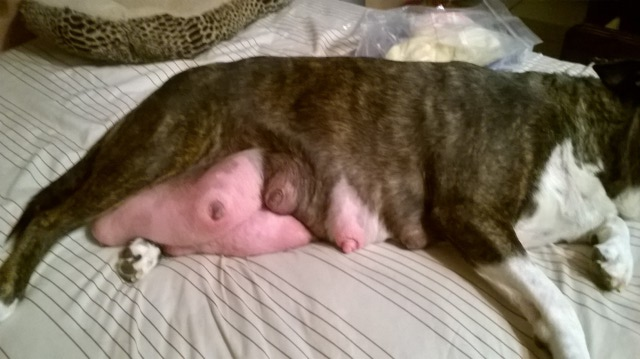Questionhi!
We recently got a 12 week old mini dachshund. He has been with us for just less than a week. We have been noticing a sense of separation anxiety everytime we are not present in the room or where he cannot see us. He will start to whimper a few times and then excessively cry and howl, almost to the point of barking. If we go to another room and notices we don't respond after awhile, he will then run to the closed door until finally we give up and gets our attention. How do we stop this behaviour?
AnswerSuch problems are much easier to prevent than fix. A puppy that was never left alone before it was 12 weeks old may have trouble accepting it. You could work at building its confidence and bonding with you. Start with obedience training. The key to most behavior problems is approaching things using the dog's natural instincts. Dogs see all the people and dogs in the household as a pack with each having their own rank in the pack and a top dog. Life is much easier if the 2 legged pack members outrank the 4 legged ones. You can learn to play the role of top dog by reading some books or going to a good obedience class. A good obedience class or book is about you being top dog, not about rewarding standard commands with a treat. Start at http://www.dogsbestfriend.com/ As you praise the dog for following your commands, it will build its confidence.
Play tug of war with the dog and lose. However at the end of the game, take the rope or toy and put it up, less the dog becomes confused about who is top dog. Ropes from the pets' store quickly turn to hazardous shreds. Ones I made lasted much better. Go to a hardware or home center that sells rope by the foot. Buy 2' of 3/4" poly rope. Melt the ends, and tie knots in it. Get them as tight as possible, put it in a vise and pound it with a hammer. Watch carefully, and be ready to discard when it comes apart.
Finally, make sure it has a den to live in. If you are not using a crate, buy one. The dog may be happier in its den than loose in the house. It relaxes, it feels safe in its den. It rests, the body slows down reducing the need for water and relieving its self. Dogs that have been crated all along do very well. Many of them will rest in their crates even when the door is open. I think the plastic ones give the dog more of a safe, enclosed den feeling. Metal ones can be put in a corner or covered with something the dog can't pull in and chew. Select a crate just big enough for the full grown dog to stretch out in.
A dog that has not been crated since it was little, may take some work.
Start out just putting its toys and treats in the crate. Praise it for going
in. Feed it in the crate. This is also an easy way to maintain order at
feeding time for more than one dog.
''Elevation for small puppies: Sit on the floor and gently put your hands around your pup's middle, below his front legs, and lift him up. He is facing you. Hold him for 15 seconds. Repeat until he no longer struggles. If he is past 10-12 weeks, lift his front feet off the ground, but don't pick him up.
Cradling for small puppies: Hold your puppy gently on his back, as you would cradle a small baby. If he struggles, hold him firmly until he quiets for 10-15 seconds. With larger pups, you can do this as your sit on the floor, with your pup between your legs.
Quiet lying down: Place your pup on the floor on his side, with all 4 legs pointing away from you. Use your hands on his neck/shoulder area and middle, to hold him in this position. When he is quiet, praise him. Lengthen the time that you keep him quietly in this position. When he accepts this position well, handle his paws and muzzle, while keeping him quiet.''
The quotes mean this isn't my original work. It is copied from my Puppy Raising Manual. I have long used these or minor variations of them, and they are very effective. You may want to give him a belly rub while he is on his back too. Helps bonding. There is a big difference between him rolling over and demanding a belly rub, and you choosing a time to roll him over and rub his belly. The latter cements your place as pack leader.
The above should eventually help, but I would let the breeder know they failed their obligation to properly socialize your puppy. I see question after question here and elsewhere from people without a clue abut what it takes that plan on breeding dogs. The period between 6 and 12 weeks is very important. If the breeder retains the puppies beyond 7-8 weeks, they need to expose them to a wide variety of experience. Failure to do so produces emotional cripples.

 willpups hair grow back to original color
Question
here is his color befo here is after &nb
willpups hair grow back to original color
Question
here is his color befo here is after &nb
 Temperature before birth
QuestionQUESTION: My female cheweenie is on day 52 of h
Temperature before birth
QuestionQUESTION: My female cheweenie is on day 52 of h
 Engorged Breasts
Question
mamma
My Friends Dog Had A Litter About
Engorged Breasts
Question
mamma
My Friends Dog Had A Litter About
 Growth on dogs right foreleg
Question
Foreleg 1 Foreleg 2
Hi Gary,
Our
Growth on dogs right foreleg
Question
Foreleg 1 Foreleg 2
Hi Gary,
Our
 Puppy wont come!
QuestionCapone & Rascal
QUESTION: Help! &nbs
Puppy wont come!
QuestionCapone & Rascal
QUESTION: Help! &nbs